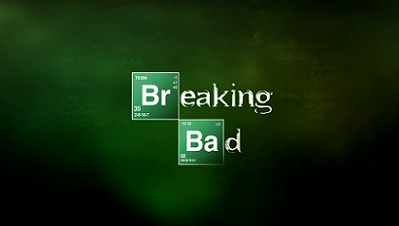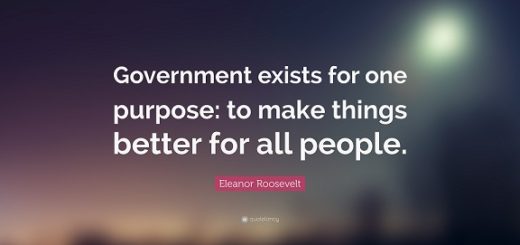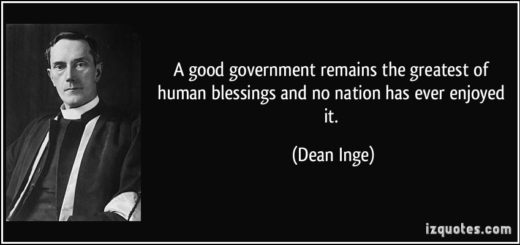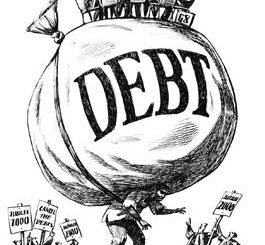Part 1: Bad Premise in Public Finance Theory

Public Finance Blunder
There is a very bad premise operating in modern economics, specifically in the foundations of Public Finance. It has marred derived theories and practices for centuries, and caused great and ubiquitous suffering of people and immense destruction of wealth from the beginnings of civilization down to present.
I have tried repeatedly to warn experts and knowledgeable thinkers of this errant rudiment, yet success is elusive. I have had the best in economics menacingly stare at me, nervously look down at their feet as they step away, or sever all communication. None seems to comprehend the flawed reasoning before their eyes no matter how clear or detailed my explanation.
It is commonly thought that government funds government; That government furnishes the funds with which to pay its bills or settle its debts. Some may immediately recognize the error in this claim, but all subsequently fail to insert this fact into a true accounting of public finances.
For demonstration I simply ask what is the present annual deficit of the US Federal Government? It takes in approximately $3 trillion in tax revenues and spends about $4 trillion. The figures may be more or less, but let us just work with these. Everyone: economists, bankers, professionals, perhaps yourself, would say $1 trillion. WRONG!!!!
Many naturally assume the government is in deficit to the amount of money expended in excess of tax revenues. To construe the delinquency as the slight gap between the revenues of Taxation and total expenditures challenges both sense and reason.
Firstly, like the records of any person or business entity, a glimpse of the financial records of government reveals unceasing inflows and outflows of funds. However, government inflows do not correspond to sales receipts, returns on investment, interest on savings, or for persons, wages received for work performed.
Whatever government enterprise one may evince as exemplar of profitable and fruitful undertakings, the circumstances of its operation are unlike those of any other firm freely competing in the market place. Government is not a Sears store inviting and persuading customers of the values inherent in stocked goods. The public has no freedom to depart the government store with money and property intact. They must pay if goods are plentiful or scarce, exceptional or inferior, cheap or dear, vital or worthless.
Payment by taxation is never measured against one’s use or consumption of the public good or service. Some are habitually in receipt of public goods and services, and pay little. Others rarely use them, yet pay inordinate amounts. Strangely, it is government that pays for public goods and services, and taxpayers that fund them.
The Taxpayer, or more fittingly the resident citizen, and further still his property, assets, and income comprise the source of outlays for public expenditures. The assorted and bewildering impositions, i.e. taxes or more correctly fines or penalties, applied to his wages, profits, consumption, savings, investments, property, financial holdings, inheritance, commerce, and trade supply the Government with the means to disburse, borrow and settle in the provision of public goods and services. His industry and wealth underwrites fully the items contracted for by a jurisdiction of needy residents with the Government as agent and most often supplier in the transaction.
Secondly, on the question of the issuance of public debt one finds a similar result. Only by examining the aggregate wealth, property, and assets of those residing within a state’s sovereign domain, of those engaged in trade of goods or labour, will the enquiry into the worthiness of the public debt bear fruit.
Imagine a man without occupation, assets, or source of income walking into a bank seeking a loan of $100,000 for a sports car? What banker would lend the seemingly improvident fellow 1 dime?
Suppose that the fellow designates a wealthy patron as the source of his funds. I would think the banker immediately would request an interview with the generous patron to ascertain security and fix terms of the loan. And that is exactly how a judicious banker would determine the rate of interest and terms to be affixed to a public loan: by assessing the wealth, income, assets, liabilities of those accountable for the obligation — the inhabitants, their combined wealth, assets, incomes, comprising the affected jurisdiction.
As government possesses no hoard of money, no assets, no financial instruments with which to meet its daily needs. Government does not fund government. It does not fund public expenditures. It never has and it never will. Thus, the US Government’s deficit is actually $4 trillion, not just the misconstrued $1 trillion.
Some have asserted that Government does garner revenues from certain profit seeking businesses such as utilities, from mineral rights to properties in production, liquor marts and beer stores, postage, toll roads, rents from public lands, casino operations, etc.
This is somewhat true, but such ventures rarely operate freely in competitive markets among keen rivals. Public businesses, often granted a monopoly or armed with especial regulations, are well protected from challenging firms offering similar or superior products.
In my home province of Manitoba, the Government has arrogated the supply of a number of goods and services to functionaries little concerned with quality or expected courtesies inherent in their sale. Liquor, frequently a sparse offering, must be distributed and sold by designated outlets, often owned and operated by always highly compensated government employees. Manitoba Hydro, a publicly owned utility enjoys a veritable monopoly on the generation and sale of electricity within the province, permitting the authority to charge whatever rate it desires. The province controls the varied forms of gambling by operating casinos and licensing use of machines. Once an outlawed vice excepting small social fundraising venues the avaricious minds of government discerned gambling’s potential in fuelling ever greater government and monopolized it.
Government has annexed title to mineral rights on lands they do not own. The Alberta Government owns about 4/5ths of the mineral rights of properties within its domain. It would have seized all had there not been identified mineral rights in place before the establishment of the province. The royalties, which the exploitation of minerals generate, should be remitted to those who own the property, those who truly own the rights. Or they should count as the income of firms engaged in extracting those minerals, performing the deft work to bring those desired minerals to the market place. Sadly, such enterprising companies or plundered property owners do not count a legislature among their persuasive instruments.
Perhaps the worst example of public enterprise may be found with the old Communist Meat Shop: a grocery operation in a country in which every industry was directly owned and controlled by government. In the meat shop, one would find a mob of government workers wandering about. Outside, one would find extensive lines of people clutching their vouchers or money, classed as demand in economics and of which there was great abundance.
But what was the problem with the Communist Meat Shop? What element was missing? As mentioned, managers, clerks and labourers were plentiful. So were those seeking goods. Money or vouchers were held by all. The government was everywhere. But what was missing from the Communist Meat Shop?
Meat! There was little or none to be had. And if this noxious drift to ever greater government continue, we shall soon have our very own Communist Meat Shop, and every other sordid Communist shop imaginable.
If the deficit were only a portion of public expenditures, I would argue that it is the taxed portion that should count as the deficit, not the borrowed portion. The lender ceded funds voluntarily for the financial inducement of interest offered by the government. There is no compulsion or coercion in the lender’s decision. His principle and interest arrives at the promised time. The taxpayer enjoys no such autonomy. The government demands and confiscates, and the powerless taxpayer must obey and yield. Regardless of one’s feeling on the issue, the taxpayer must eventually settle the public debt and interest incurred when tax revenues failed to supply enough.
As one muddles through perplexing assertions and arguments on Deficits, hold one thought in high regard, “The Taxpayer – his property, assets, income – funds government – all of it. Government does not fund government.” The deficit comprises the whole of government expenditures, those outlays funded by both Taxation and Borrowing. The aggregate public debt comprises every dime spent by government since its inception, not just the comparatively small and cumulative debt obligation outstanding. The inability to recognize and account this palpable fact has fostered and reinforced the worst of conclusions, the worst of practices, and the worst of consequences.
By acknowledging this simple truth, one may immediately reason and know that a revolution is near; That Taxation, as intrusive as it is destructive of wealth and well-being, is in its twilight. A new age bereft of the stifling and ruinous scourge lay within our grasp. But that is another article.




1 Response
[…] To Read More On This Step – Click Here […]